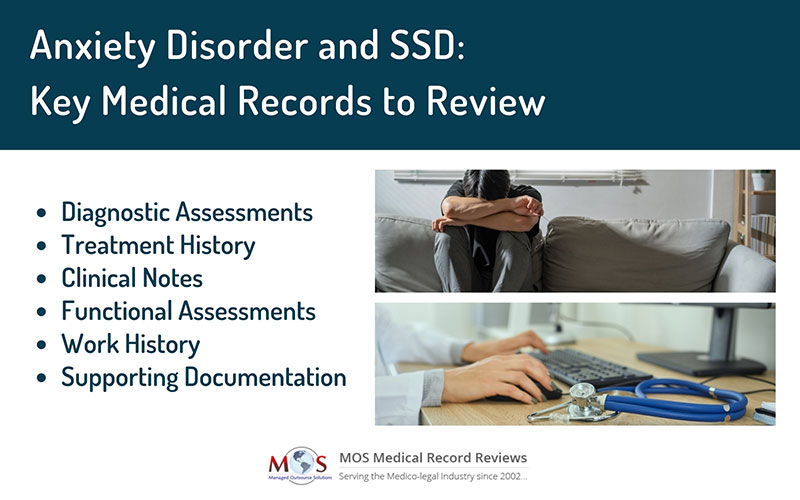Anxiety disorder is a mental health condition characterized by excessive worry, fear, or apprehension that can significantly impact daily life and functioning. The Social Security Administration (SSA) considers anxiety as a disability. However, people with anxiety may find it challenging to prove that their impairment qualifies them for monthly disability benefits. Social Security’s definition of disability is “any medically determinable mental or medical impairment that has prevented an individual from performing substantial work for twelve months, is expected to prevent an individual from working for twelve continuous months, or is expected to end with death”.
Disability benefits for anxiety are typically granted if the condition renders an individual unable to work or manage daily life independently. However, eligibility criteria set by the SSA are stringent for such cases, applying to various mental health conditions, including anxiety. To qualify for disability benefits due to anxiety disorder, one must demonstrate a diagnosed condition and either show significant impairment in mental capabilities or establish persistent and severe anxiety lasting a minimum of two years.
Medical record analysis plays a crucial role in determining eligibility for disability benefits related to anxiety disorder. It provides concrete evidence of the diagnosis and its severity, offering insights into the individual’s medical history, treatment plans, and response to interventions. By thoroughly examining these records, evaluators can assess the impact of the anxiety disorder on the individual’s daily functioning, work capacity, and overall quality of life. This comprehensive review ensures that applicants who genuinely require support due to their condition receive the necessary assistance, while also guarding against fraudulent claims.
Get detailed medical record analysis for Social Security Disability cases!
Call (800) 670-2809!
Medical Evidence for Anxiety Disorders
The medical evidence for anxiety disorders is mostly based on criteria that are difficult to document such as external symptoms that may occur outside the physician’s office and is usually reported by the patient to the physician. Subjective evidence such as this may not be sufficient for the SSD to allow a disability claim. However, when representing a claimant who is applying for disability benefits caused by an anxiety disorder, a social security disability lawyer would focus on collecting and presenting medical records that contain a detailed history of treatment by the claimant’s physician, a qualified mental health professional and other medical professionals involved in the treatment. Such records would help to prove the recurrent or persistent nature of the particular mental disorder.
To qualify for disability benefits under anxiety-related disorders, the applicant’s medical records must establish the following:
- Generalized anxiety disorder that is persistent with any three of these four symptoms – autonomic hyperactivity, apprehensive expectation, motor tension, vigilance and scanning
- Persistent unreasonable fear of an object, situation or activity that leads to a predominant desire to avoid that object, situation or activity
- Severe panic attacks that recur and are characterized by intense fear, terror, apprehension and a sense of approaching doom, occurring at least once a week
- Repetitive obsessions or compulsions that create notable distress
- Repetitive remembrances of a painful experience that cause considerable distress
The above-mentioned conditions should result in at least two of the following or result in the applicant’s total inability to function independently outside his/her home.
- Significant problems in maintaining concentration
- Marked difficulties with persistence, or pace
- Recurrent periods of decompensation, each of extended duration
- Significant difficulties maintaining social functioning or difficulty in carrying out routine activities of daily life
Social Security would need a complete list of all the medications the applicant is taking for anxiety/depression. They would also require details of the treating physician, the dosages, whether the claimant has experienced any side effects and so on. In addition, details regarding any therapist the claimant may be seeing, social worker, psychologist or psychiatrist would also be needed. Social Security would have to consider how a claimant’s psychological symptoms are affecting his/her ability to work.
Establishing total disability based on anxiety disorder can be challenging due to its subjective nature. However, medical professionals and experienced social security disability lawyers can collaborate closely to gather and present the necessary medical documentation, ensuring a strong case for the applicant’s disability claim. Medical record review is crucial for social security disability lawyers as it provides comprehensive insight into the client’s medical history, enabling them to build a strong case supported by evidence. By properly examining the medical records, lawyers can identify relevant details, establish the severity of the client’s condition, and effectively advocate for their disability claim before the Social Security Administration.
Maximize your clients’ chances of Social Security Disability approval with our expert medical record review services!
Call (800) 670-2809!





